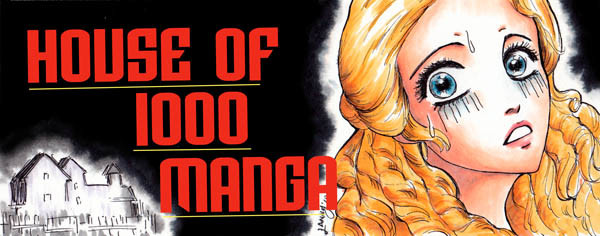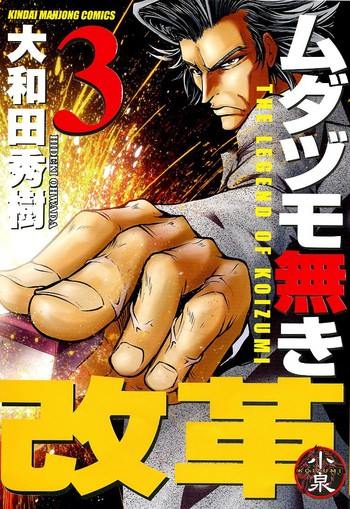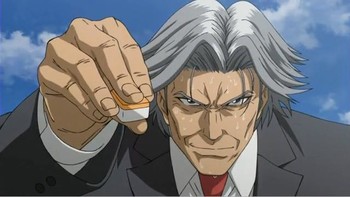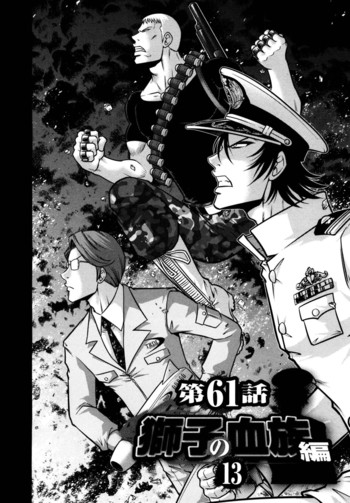House of 1000 Manga
The Legend of Koizumi
by Jason Thompson,

House of 1000 Manga: Mudazumo Naki Kaikaku (The Legend of Koizumi)
"THIS is mahjong on the international level! You must reach this level, even if it makes you cough blood!"
—Mudazumo Naki Kaikaku
"A fucking travesty…not only completely irresponsible but an offensive against (everyone) killed by the Nazis…there are fundamental limits of taste and piety…"
—some humorless io9 commenter

I often dream that manga would have politics as much as American comics: any random Grant Morrison, Garth Ennis or Mark Millar storyline has more political commentary (usually totally heavy-handed, but still) than everymainstream shonen manga combined. But so far, only Mudazumo Naki Kaikaku sates my desires. Created by humor mangaka Hideki Ohwada as an irregular feature in Kindai Mahjong Original back in 2006, it had its first collected volume in 2008, and since then, it's achieved 9 volumes, an OAV, and total dominance of a small but important world: the world of political satire mahjong shonen battle manga.
Politics seems like natural material for exciting stories (House of Cards, amirite?), but it's a fact: the Japanese media is even more politically apathetic than the US. Although voter turnouts in Japan aren't that much different than in the U.S. (i.e. low), there is a general feeling of voter apathy: the conservative Liberal Democratic Party has dominated the government almost continually since 1955, politics is generally felt to be controlled by seniority and old money; and until as recently as 2013, politicians weren't allowed to campaign online, and were forced to rely on old-media methods like driving around Tokyo from 8 am to 8 pm with loudspeakers blaring campaign slogans. It's also arguable that ideological tensions simply aren't so high in Japan, so you don't get the major, moralistic, right-vs-left battles you see in the US. However, it's also a fact: manga is great at making mundane things seem like the most exciting things in the world. And so of course there's manga about superpoliticians, often about idealists who are trying to reform the system, usually in a high-on-charisma, light-on-policy-specifics way. Examples include the seinen manga Eagle, which is set in America, and Sanctuaryand Billion Dogs for a politics/crime mashup, and the shonen manga Kunimitsu no Matsuri. I'll leave out the "the prime minister of Japan can have any girl he wants" shojo smut Millennium Prime Ministerand the "reform the system by killing politicians" Akumetsu.
In reality, politics may seem like it's mostly charisma but it involves a lot of laws and rules and clever maneuvering and also a lot of random chance, and something else that involves a lot of rules and maneuvers and random chance is, of course, mahjong. Mudazumo Naki Kaikaku is the story of Junichiro Koizumi, LDP Prime Minister from 2001 to 2006. In real life, Koizumi is probably the closest thing Japan has had recently to a "media star politician" in the American style: elected to five one-year terms, he was an economic reformist, a right-wing nationalist, and check out that silver-fox mane of hair! In this manga, he's also an incredible mahjong champion who challenges other world leaders to mahjong battles to determine public policy and generally kick ass. The title, "Reform without Wasted Tsumo" (a mahjong term), is a parody of Koizumi's campaign slogan, "Seiiki naki Kaikaku" (Reform without Sanctuary/Exceptions), but it's so melodramatic I kept thinking of Jingi Naki Tatakai.
Just like how in Yu-Gi-Oh! all disputes are settled by collectible card games, here, everything is settled by mahjong. It starts with George H.W. Bush and Koizumi engaged in a heated session of "international diplomacy." Turns out that Bush is an old Texas gambler and mahjong is his favorite game, and soon Koizumi and Bush are dueling it out with American F-15 fighter jets as the stakes. Since mahjong is a four-person game, Donald Rumsfeld and Condoleeza Rice join the match (three against one!), while hapless Japanese politician Taizo Sugimura fills the role of the "pathetic, pants-wetting sidekick who loses to the bad guy (Bush) and gets humiliated so Koizumi can rescue him."
Koizumi wins, after a long hard battle where everyone calls out moves based on their country's political positions: Bush has the "Patriot tsumo! Bush doctrine riichi!" but Koizumi has the "Rising Sun!!!" You get the impression the whole thing started as a one-off and was so popular it just kept going. In chapter two, defeated Bush runs back to his daddy, the original George Bush, who's depicted as a towering, gray-haired embodiment of America's World War 2 military glory days. "Dad! Koizumi won our F-15s! Let's tell everyone they have weapons of mass destruction!" Bush snivels. But Original George is a true mahjong player, and he, too, challenges Koizumi on the tabletop. THEN!!! In chapter three, Koizumi, still stinging from battle, is summoned to an aircraft carrier where he must fight North Korean leader Kim Jong-il! During the match, a North Korean sniper tries to shoot Koizumi, but he's shot by a counter-sniper, Koizumi's LDP buddy Taro Aso. Kim is such a sore loser that, when defeated, he launches a nuclear missile at Japan, forcing Koizumi to jump into a fighter jet and intersect the missile to save his country, while the X Japan song "FOREVER LOVE" (which Koizumi used in his campaign commercials) plays in the background. But a mere nuclear blast can't stop Koizumi, and in the next chapter, he's back! His opponent: Vladimir Putin. And after that, he fights the greatest mahjong player of the Catholic world, Pope Ratzinger!
It quickly becomes obvious that Mudazumo Naki Kaikaku isn't really about mahjong—it's about every shonen battle manga trope you can imagine. Making fun of politicians (and a little mahjong) is the joke, but shonen manga is the language. It's all about how tough you are, how many speedlines you have, and shouting out the names of your moves as you do them. (Putin: "SIBERIAN EXPRESS!!") The heroes strength-train by using mahjong tiles made of depleted uranium, or playing mahjong in a pool of coal tar. The limits of the human body, and the game rules, are repeatedly broken: one of Koizumi's signature moves is gômôpai, the ability to erase symbols from mahjong tiles with finger friction, turning them into handy blank tiles. Blood spurts from Koizumi's hand as he pulls off tsumo after thrilling tsumo! Clothes are torn off and heads exploded by sheer mahjong power, measured in numbers just like in DBZ, with Ohwada even using the direct quote "IT'S OVER 8,000!!" (Okay, 9,000 in the English dub version.) "This old man's life is a small price to pay for world peace!!!" Koizumi cries!

Politically, the manga's positions are fairly conservative, in keeping with its lionization of hawkish figures like Koizumi (who sent Japanese troops to Iraq and visited the controversial Yasukuni Shrine to WWII Japanese soldiers) and Taro Aso (infamous for his racist comments). Liberal, pacifistic politicians like Yuko Hatoyama generally come off as enemies and losers. But like the old SNL skit/comic book X-Presidents, just because Koizumi has superpowers doesn't mean he isn't actually being made fun of. All the politicians in Mudazumo are totally ruthless, shouting slogans like "The Japanese economic miracle!" and "The American Way!" as they do whatever it takes to win. But there's a soft side to politicians too, and even George H.W. Bush gets his moment of redemption, in an emotional flashback involving memories of his life as a high school trying to live up to daddy's expectations, and singing "Take Me Out to The Ball Game." It's all an insane exaggeration of nationalistic politics—but then again, there are actual conservatives who like Stephen Colbert, so who knows? There's something here for everyone to be offended by, or to love. For the first six volumes at least, this manga is a shameless masterpiece, and begging to be snatched up by some insane US publisher. (After all, it's been officially licensed in Thailand!)
Mudazumo Naki Kaikaku isn't entirely fearless; there are controversies even it chooses not to include. You'd think the Liancourt Rocks dispute would be easily settled by a mahjong match between Japan and South Korea, but South Korea doesn't appear; perhaps it's because South Korean fans have protested Korean images in anime and manga in the past. China, another nation with assorted unresolved issues with Japan, seems like a natural subplot since it was the birthplace of mahjong, but it doesn't show up in the manga for ages. (To its credit, the OAV, written by Ohwada, brings the promised China story arc, culminating with the resurrection of Pol Pot and Chairman Mao as the ultimate enemy.) India doesn't rate, nor does most of Europe, nor the Arab and Islamic world, perhaps also because Japanese publishers shy away from controversy, or perhaps there's just not enough pages in the manga. Like in Hollywood, where it's easier for economic and "not wanting to seem racist" reasons to film a movie where every Russian character is a total scumbag than a movie where China invades the US, choosing the right villains is tough.

Which is why Ohwada goes the easiest, and yet somehow best, route when he introduces the main villains of the manga in volume 2: SPACE NAZIS. (Why is it always Nazis? Not to harp on the trendy anti-Russian thing, but when will Stalinists get their chance to come back from the dead and conquer us?) Suddenly, giant Nazi flying saucers appear from the moon and blast the Earth's cities, terrorizing humanity. The Nazis' demand: Earth must choose its five greatest mahjong champions to fight five Nazi champions, and to the winners, the Earth! In true Dragon Ball Z style, Koizumi gathers up a gang of defeated enemies, including Putin, Bush, Bush Sr., and one new politician…Yulia Tymoshenko, the then-Ukrainian prime minister and wealthy businesswoman probably chosen by Ohwada more for her moe good looks (those BRAIDS) than her not inconsiderable political accomplishments. (Shortly after her part in the manga ended, she was thrown in jail IRL for embezzlement.) With death by electric chair awaiting the losers, they must face an army of mahjong-playing Nazis: Josef Mengele, Rudolf Hess, Herman Goring, Goebbels' grandchildren Tristan and Isolde, and the master of all Nazis, ADOLF HITLER. In an epic battle on the surface of the moon, Koizumi faces Hitler, fortified by training with the ghosts of the last three people who beat Hitler: Roosevelt, Churchill and Stalin. But Hitler has powered up since WW2: he can now transform into a blonde, unstoppable Super Aryan Hitler, and even worse, the swastika-haired SUPER ARYAN HITLER STAGE 2!!!
The problem with most shonen manga is that they run on too long, and alas, Mudazumo Naki Kaikaku imitates the classics in this way as well. After the (SPOILER) apocalyptic events of volume 6, which ends with Koizumi apparently dead, the manga returns to Earth and switches to a new main character: Captain Sanada, a Japan Maritime Self-Defense Force sea captain who we first see kicking the asses of Somali pirates. Always in uniform, Sanada is the military version of a Jotaro Kujo-style surly badass,and surprise, he's also not based on any particular real person—and neither are his buddies, super-ripped JGSDF Master Sergeant Okumura or Technical Research and Development Institute brainiac Inui. Together, they represent the Japanese military, which becomes the de facto hero of the new story arc, defending Japan against the world and against liberal politicians that want to slash the military's funding. (One of their first mahjong opponents is Takako Doi, the grey-haired eminence of Japanese socialists and leftists.)
The return to specifically Japanese politics, away from international battles, obviously limits the manga's appeal to foreign readers…but OTOH, you have to cut back the power level once in awhile, it's OK to start a story arc about Goten and Trunks while too-powerful-for-the-story Goku is out of the picture, isn't it? (And yet, the truth is, everyone's just waiting for Goku to show up…) Unfortunately for Ohwada's plot, politics can move even faster than manga: in the real world, liberal politician Yukio Hatayama lost the office of Prime Minister in 2010 after less than a year in office (after failing to keep his campaign promise to close US military bases in Okinawa), but in Mudazumo Naki Kaikaku, our conservative heroes are still fighting him years later. In addition to being focused on internal Japanese politics instead of global chaos, the new arc is annoyingly slow-paced compared to the beginning of the series where each chapter brought new madness. Presumably Ohwada is saving his hand while he builds up to a new global story arc, but alas, The Legend of Koizumi without Koizumi just isn't the same. And the glorification of militarism, which was just an undercurrent in the original story arc, is now front and center.
Frankly, the things that make Mudazumo Naki Kaikaku awesome as a shonen battle manga—more-or-less black-and-white morality, ruthless heroes, a delight in bloodshed and collateral damage—are the same things that make it totally awful as a depiction of real-world politics. But just like how zombie movies are really all about shooting your neighbors, it's still oh so satisfying, and who doesn't want to see their political opponents smashed in the face with mahjong tiles and forced to concede, not just political, but physical, moral and spiritual victory? Although after the sixth volume Mudazumo sort of limps along in a half-assed way, a shadow of its former greatness, I still dream of a great new story arc: if you seek worthy opponents, where is Obama? Where is Pope Francis? Is Yulia Tymoshenko still a contender after the Russian incursion in Ukraine? What about Israeli Prime Minister Benjamin Netanyahu ("I know what America is…America is a thing you can move very easily"), Egyptian General Sisi, and all the other Middle Eastern political factions? And my prayers for towering tastelessness and ballsiness have not gone unanswered: the current storyline in Japan involves the Senkaku Islands Dispute and the long-awaited appearance of CHINA. Yes, they go there. I'm looking forward to it. After all, remember: no matter what Ohwada draws, it's still not 1/10th as offensive as Hetalia.
discuss this in the forum (7 posts) |

